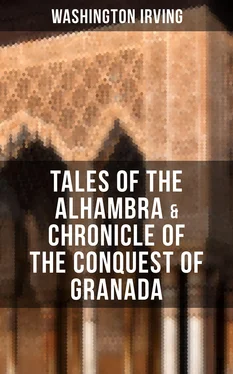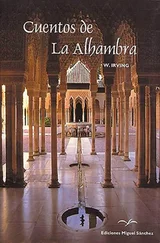*Ay una puerta en la Alhambra por la qual salio Chico Rey de los Moros, quando si rindio prisionero al Rey de Espana D. Fernando, y le entrego la ciudad con el castillo. Pidio esta principe como por merced, y en memoria de tan importante conquista, al que quedasse siempre cerrada esta puerta. Consintio en allo el Rey Fernando, y des de aquel tiempo no solamente no se abrio la puerta sino tambien se construyo junto a ella fuerte bastion. — MORERI’S Historical Dictionary.
*The minor details of the surrender of Granada have been stated in different ways even by eyewitnesses. The author, in his revised edition of the Conquest, has endeavored to adjust them according to the latest and apparently best authorities.
Table of Contents
My devoted squire and whilom ragged cicerone Mateo Ximenes, had a poor-devil passion for fates and holidays, and was never so eloquent as when detailing the civil and religious festivals of Granada. During the preparations for the annual Catholic fete of Corpus Christi, he was in a state of incessant transition between the Alhambra and the subjacent city, bringing me daily accounts of the magnificent arrangements that were in progress, and endeavoring, but in vain, to lure me down from my cool and airy retreat to witness them. At length, on the eve of the eventful day I yielded to his solicitations and descended from the regal halls of the Alhambra under his escort, as did of yore the adventure-seeking Haroun Alraschid, under that of his Grand Vizier Giaffar. Though it was yet scarce sunset, the city gates were already thronged with the picturesque villagers of the mountains, and the brown peasantry of the Vega. Granada has ever been the rallying place of a great mountainous region, studded with towns and villages. Hither, during the Moorish domination, the chivalry of this region repaired, to join in the splendid and semi-warlike fetes of the Vivarrambla, and hither the elite of its population still resort to join in the pompous ceremonials of the church. Indeed, many of the mountaineers from the Alpuxarras and the Sierra de Ronda, who now bow to the cross as zealous Catholics, bear the stamp of their Moorish origin, and are indubitable descendants of the fickle subjects of Boabdil.
Under the guidance of Mateo, I made my way through streets already teeming with a holiday population, to the square of the Vivarrambla, that great place for tilts and tourneys, so often sung in the Moorish ballads of love and chivalry. A gallery or arcade of wood had been erected along the sides of the square, for the grand religious procession of the following day. This was brilliantly illuminated for the evening as a promenade; and bands of music were stationed on balconies on each of the four facades of the square. All the fashion and beauty of Granada, all of its population of either sex that had good looks or fine clothes to display, thronged this arcade, promenading round and round the Vivarrambla. Here, too, were the majos and majas, the rural beaux and belles, with fine forms, flashing eyes, and gay Andalusian costumes; some of them from Ronda itself, that stronghold of the mountains, famous for contrabandistas, bull-fighters, and beautiful women.
While this gay but motley throng kept up a constant circulation in the gallery, the centre of the square was occupied by the peasantry from the surrounding country; who made no pretensions to display, but came for simple, hearty enjoyment. The whole square was covered with them; forming separate groups of families and neighborhoods, like gipsy encampments, some were listening to the traditional ballad drawled out to the tinkling of the guitar, some were engaged in gay conversation, some were dancing to the click of the castanet. As I threaded my way through this teeming region with Mateo at my heels, I passed occasionally some rustic party, seated on the ground, making a merry though frugal repast. If they caught my eye as I loitered by, they almost invariably invited me to partake of their simple fare. This hospitable usage, inherited from their Moslem invaders, and originating in the tent of the Arab, is universal throughout the land, and observed by the poorest Spaniard.
As the night advanced, the gayety gradually died away in the arcades; the bands of music ceased to play, and the brilliant crowd dispersed to their homes. The centre of the square still remained well peopled, and Mateo assured me that the greater part of the peasantry, men, women, and children, would pass the night there, sleeping on the bare earth beneath the open canopy of heaven. Indeed, a summer night requires no shelter in this favored climate; and a bed is a superfluity, which many of the hardy peasantry of Spain never enjoy, and which some of them affect to despise. The common Spaniard wraps himself in his brown cloak, stretches himself on his manta or mule-cloth, and sleeps soundly, luxuriously accommodated if he can have a saddle for a pillow. In a little while the words of Mateo were made good; the peasant multitude nestled down on the ground to their night’s repose, and by midnight, the scene on the Vivarrambla resembled the bivouac of an army.
The next morning, accompanied by Mateo, I revisited the square at sunrise. It was still strewed with groups of sleepers: some were reposing from the dance and revel of the evening; others, who had left their villages after work on the preceding day, having trudged on foot the greater part of the night, were taking a sound sleep to freshen themselves for the festivities of the day. Numbers from the mountains, and the remote villages of the plain, who had set out in the night, continued to arrive with their wives and children. All were in high spirits; greeting each other and exchanging jokes and pleasantries. The gay tumult thickened as the day advanced. Now came pouring in at the city gates, and parading through the streets, the deputations from the various villages, destined to swell the grand procession. These village deputations were headed by their priests, bearing their respective crosses and banners, and images of the blessed Virgin and of patron saints; all which were matters of great rivalship and jealousy among the peasantry. It was like the chivalrous gatherings of ancient days, when each town and village sent its chiefs, and warriors, and standards, to defend the capital, or grace its festivities.
At length all these various detachments congregated into one grand pageant, which slowly paraded round the Vivarrambla, and through the principal streets, where every window and balcony was hung with tapestry. In this procession were all the religious orders, the civil and military authorities, and the chief people of the parishes and villages: every church and convent had contributed its banners, its images, its relics, and poured forth its wealth for the occasion. In the centre of the procession walked the archbishop, under a damask canopy, and surrounded by inferior dignitaries and their dependants. The whole moved to the swell and cadence of numerous bands of music, and, passing through the midst of a countless yet silent multitude, proceeded onward to the cathedral.
I could not but be struck with the changes of times and customs, as I saw this monkish pageant passing through the Vivarrambla, the ancient seat of Moslem pomp and chivalry. The contrast was indeed forced upon the mind by the decorations of the square. The whole front of the wooden gallery erected for the procession, extending several hundred feet, was faced with canvas, on which some humble though patriotic artist had painted, by contract, a series of the principal scenes and exploits of the Conquest, as recorded in chronicle and romance. It is thus the romantic legends of Granada mingle themselves with every thing, and are kept fresh in the public mind.
As we wended our way back to the Alhambra, Mateo was in high glee and garrulous vein. “Ah, senor,” exclaimed he, “there is no place in all the world like Granada for grand ceremonies (funciones grandes); a man need spend nothing on pleasure here, it is all furnished him gratis. Pero, el dia de la Toma! ah, senor! el dia de la Toma!” “But the day of the Taking! ah, senor, the day of the Taking” — that was the great day which crowned Mateo’s notions of perfect felicity. The Dia de la Toma, I found, was the anniversary of the capture or taking possession of Granada, by the army of Ferdinand and Isabella.
Читать дальше












